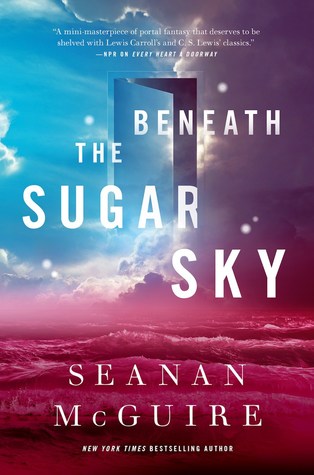 Beneath the Sugar Sky (Wayward Children, #3) by Seanan McGuire
Beneath the Sugar Sky (Wayward Children, #3) by Seanan McGuire Format: ebook
Source: purchased from Amazon
Formats available: hardcover, ebook, audiobook
Genres: fantasy, portal fantasy, urban fantasy, young adult
Series: Wayward Children #3
Pages: 174
Published by Tordotcom on January 9, 2018
Purchasing Info: Author's Website, Publisher's Website, Amazon, Barnes & Noble, Kobo, Bookshop.org
Goodreads
Beneath the Sugar Sky, the third book in McGuire's Wayward Children series, returns to Eleanor West's Home for Wayward Children in a standalone contemporary fantasy for fans of all ages. At this magical boarding school, children who have experienced fantasy adventures are reintroduced to the "real" world.
When Rini lands with a literal splash in the pond behind Eleanor West's Home for Wayward Children, the last thing she expects to find is that her mother, Sumi, died years before Rini was even conceived. But Rini can’t let Reality get in the way of her quest – not when she has an entire world to save! (Much more common than one would suppose.) If she can't find a way to restore her mother, Rini will have more than a world to save: she will never have been born in the first place. And in a world without magic, she doesn’t have long before Reality notices her existence and washes her away. Good thing the student body is well-acquainted with quests...
A tale of friendship, baking, and derring-do. Warning: May contain nuts.
My Review:
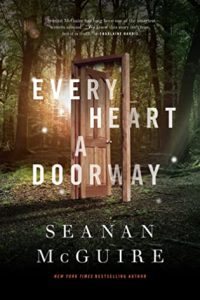 I have read the Wayward Children series completely out of order, so instead of the usual 1,2,3 progression it’s been 1,6,7,2 and now three. And it still makes sense – or at least as much sense as it’s supposed to consider that many of the doors that the children who come to Miss West’s School have come through have been from worlds with more than a bit of Nonsense in them.
I have read the Wayward Children series completely out of order, so instead of the usual 1,2,3 progression it’s been 1,6,7,2 and now three. And it still makes sense – or at least as much sense as it’s supposed to consider that many of the doors that the children who come to Miss West’s School have come through have been from worlds with more than a bit of Nonsense in them.
As does the world of Confection, the place the late and much lamented Sumi came from, and to which she expected to return. Not just hoped, but actually expected, because Sumi was from Confection, and she had been told she had a destiny there that she had to go back and meet when the time was right.
But Sumi’s destiny was interrupted by Jack and Jill’s bloodthirsty quest to re-open their door back to the Moors in Every Heart a Doorway – and I just realized that the title is a bit of a macabre pun because by a certain interpretation Sumi’s bloody heart was literally Jack and Jill’s doorway. So when Sumi’s daughter Rini, a daughter Sumi was much, much too young to have already had before she was killed, literally drops out of the sky into a fountain at the school, there’s more than a bit of problem and a quest has certainly come knocking on Miss West’s door – in spite of the sign that prohibits quests on school grounds.
Rini is in the middle of a Back to the Future situation. Specifically, the situation in the first movie where Marty starts disappearing because he’s changed the timeline too much and won’t be born. Rini is in the same predicament, even though it’s not her fault that her mother won’t be coming back to Confection to marry her father and give birth to her.
But it’s not just Rini herself that’s being erased. The entire timeline where Sumi saved Confection from the evil and entirely too Orderly and Logical Queen of Cakes is also being erased – with disastrous consequences for the people of Confection.
In order to save Rini and save her world, several of the children are going to have to whistle Sumi’s bones out of her grave and take them on a journey to the Lord of the Dead to see if there’s a way to bring Sumi back from death and save both her world and her daughter.
It’s an adventure. It’s something to do while they each wait for their own doors to open again. And it will save Sumi, Rini, and their entire world. Unless the children lose themselves along the way.
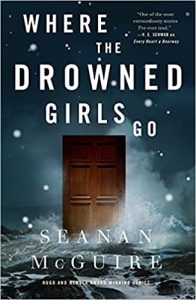 Escape Rating A-: I picked this up now because I read Where the Drowned Girls Go for a Library Journal review last month and, while I didn’t have any problems getting into the story, it was pretty clear that the characters in that 7th book in the series had been on previous adventures together. Beneath the Sugar Sky looked like one of those previous adventures, so I was determined to get to it as soon as possible.
Escape Rating A-: I picked this up now because I read Where the Drowned Girls Go for a Library Journal review last month and, while I didn’t have any problems getting into the story, it was pretty clear that the characters in that 7th book in the series had been on previous adventures together. Beneath the Sugar Sky looked like one of those previous adventures, so I was determined to get to it as soon as possible.
Not that one can’t read this series entirely out of order as I seem to be doing. It’s just that there’s clearly important stuff that I missed and now I want to know what it was. So here we are. Or there they are.
The story in Beneath the Sugar Sky is a story wrapped around found family and friendship. It’s not that Kade, Cora, Christopher and Nadya don’t want to save Rini and her world, because they absolutely do. But their real motivation for taking on this quest is to save their friend Sumi. They don’t know Rini yet but Sumi is loved and missed and their quest is to bring her back to life.
Along the way the quest becomes as much about saving each other as resurrecting their friend, with a huge heaping helping about body shaming, accepting yourself for who you are and living your best life as that person, and learning how to make your strengths really, really count when the chips are down – even if most people see those strengths as faults or weaknesses.
All of that is at the heart of Cora’s story, a story which continues for certain in Where the Drowned Girls Go, but also possibly in Come Tumbling Down, which I have not read yet and obviously need to. Because it was Cora’s story in Drowned Girls that made me go flying backwards through the rest of the series. I picked this up because I wanted to know more about Cora’s story and now that I know more I want to know even more. And I will.
But first I have In an Absent Dream to look forward to. And I so definitely am!

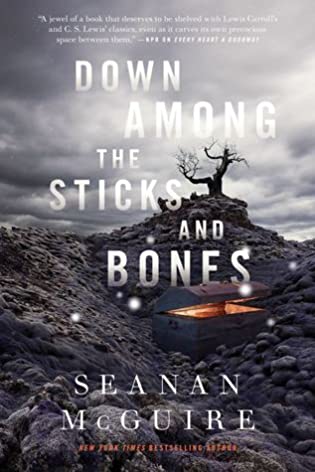 Down Among the Sticks and Bones (Wayward Children, #2) by
Down Among the Sticks and Bones (Wayward Children, #2) by 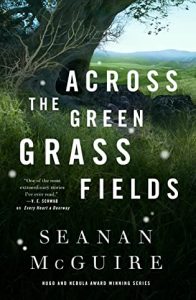 Escape Rating A-: Jack and Jill Wolcott are just two of the Wayward Children that we met in
Escape Rating A-: Jack and Jill Wolcott are just two of the Wayward Children that we met in 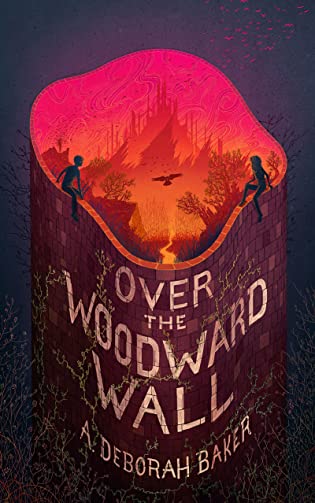 Over the Woodward Wall (The Up-and-Under, #1) by
Over the Woodward Wall (The Up-and-Under, #1) by 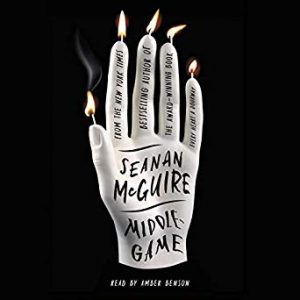 Like Wonderland and Narnia, there are four kings and queens – or there are supposed to be four kings and queens. But the royals currently in office are all rather like the Wicked Witch of the West, or the White Witch in Narnia. While the road that Zib and Avery are traveling on, like the Yellow Brick Road of Oz, is neither as straight nor as without danger as the locals claim it to be. Although Zib and Avery’s companions, the Crow Girl and the Drowning Girl, while they are certainly missing something essentially it’s nothing so straightforward as brains, a heart or even the nerve, nor is it going to be as simple to discover how to get them back.
Like Wonderland and Narnia, there are four kings and queens – or there are supposed to be four kings and queens. But the royals currently in office are all rather like the Wicked Witch of the West, or the White Witch in Narnia. While the road that Zib and Avery are traveling on, like the Yellow Brick Road of Oz, is neither as straight nor as without danger as the locals claim it to be. Although Zib and Avery’s companions, the Crow Girl and the Drowning Girl, while they are certainly missing something essentially it’s nothing so straightforward as brains, a heart or even the nerve, nor is it going to be as simple to discover how to get them back.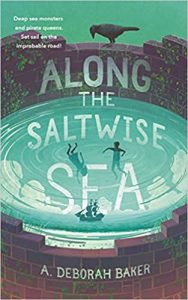 Zib and Avery are changing all the time, and as we learn at the end of the story, real time is passing both for them and for their parents back home. While on the one hand this feels like a fairy tale, on the other it definitely reads like a journey with consequences. Zib and Avery have an important mission to complete in the Up-and-Under, and their experiences in that world have already changed them from who they were – and who they would have become as a result. They already see the world differently, and it feels like those changes are going to have long-term effects, just as the children’s journeys do in Wayward Children.
Zib and Avery are changing all the time, and as we learn at the end of the story, real time is passing both for them and for their parents back home. While on the one hand this feels like a fairy tale, on the other it definitely reads like a journey with consequences. Zib and Avery have an important mission to complete in the Up-and-Under, and their experiences in that world have already changed them from who they were – and who they would have become as a result. They already see the world differently, and it feels like those changes are going to have long-term effects, just as the children’s journeys do in Wayward Children.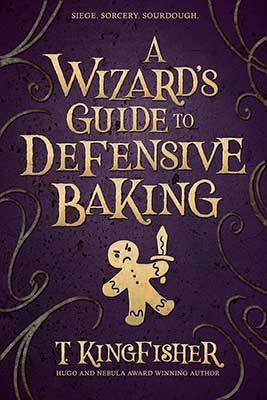 A Wizard’s Guide to Defensive Baking by
A Wizard’s Guide to Defensive Baking by 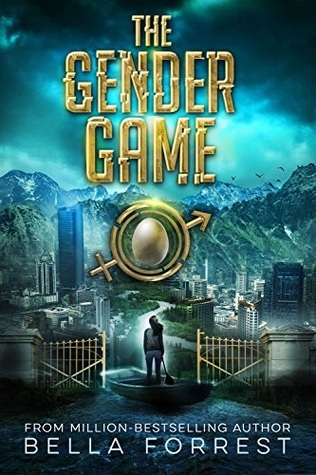 The Gender Game by
The Gender Game by 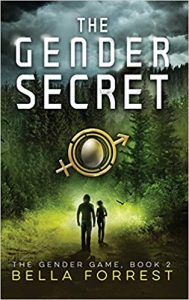 As I read through The Gender Game, I looked at my e-book reader and saw I was near the end. I thought about not finishing it, because it seemed kind of predictable in the early pages – Violet trains up for the heist, she and her Patrian ally decide who to frame, she interacts with the scapegoat – I don’t really need to go on, do I? But I’m glad I read all the way to the end! We get a plot twist right in the final pages that sets up the second story in this series,
As I read through The Gender Game, I looked at my e-book reader and saw I was near the end. I thought about not finishing it, because it seemed kind of predictable in the early pages – Violet trains up for the heist, she and her Patrian ally decide who to frame, she interacts with the scapegoat – I don’t really need to go on, do I? But I’m glad I read all the way to the end! We get a plot twist right in the final pages that sets up the second story in this series, 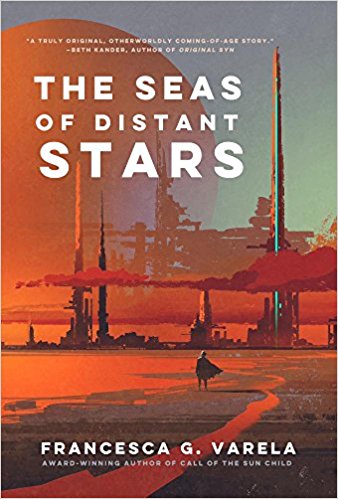 The Seas of Distant Stars by
The Seas of Distant Stars by 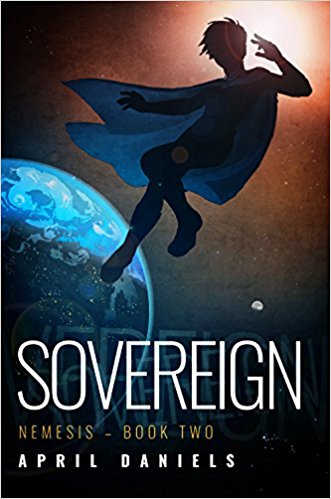 Sovereign (Nemesis, #2) by
Sovereign (Nemesis, #2) by 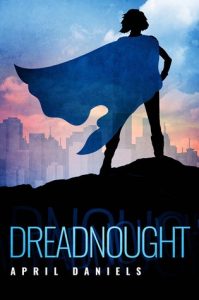 A few months ago, Marlene sent me
A few months ago, Marlene sent me 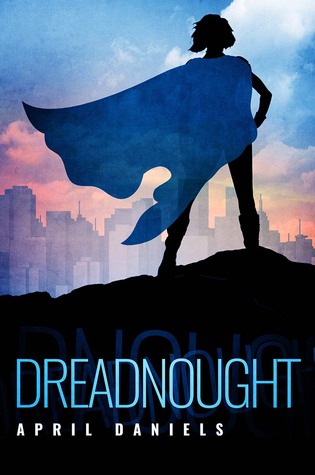 Dreadnought (Nemesis, #1) by
Dreadnought (Nemesis, #1) by